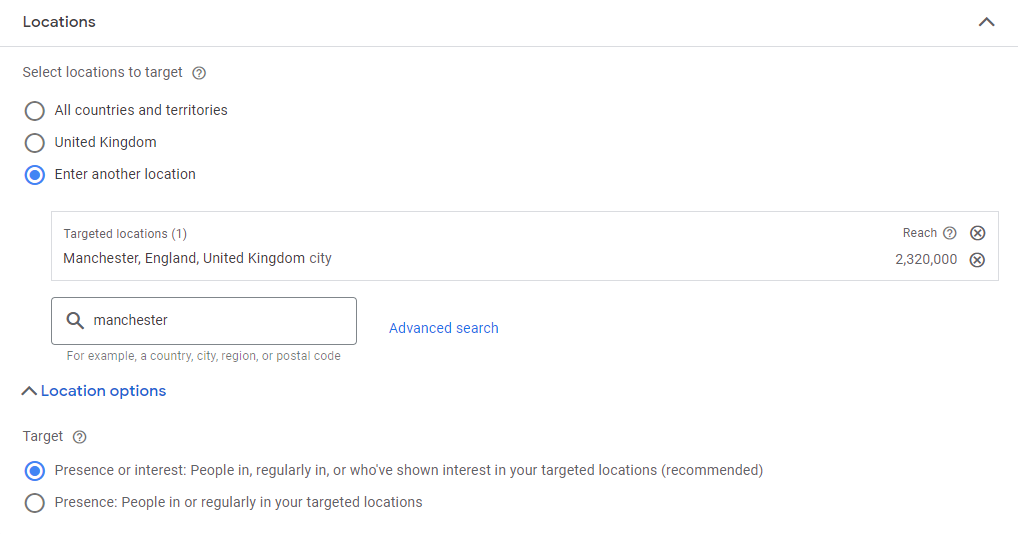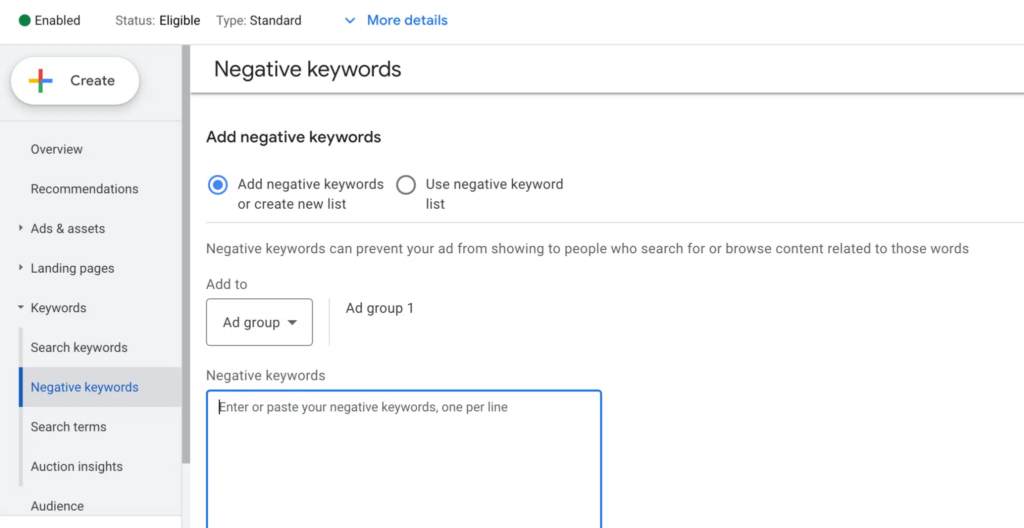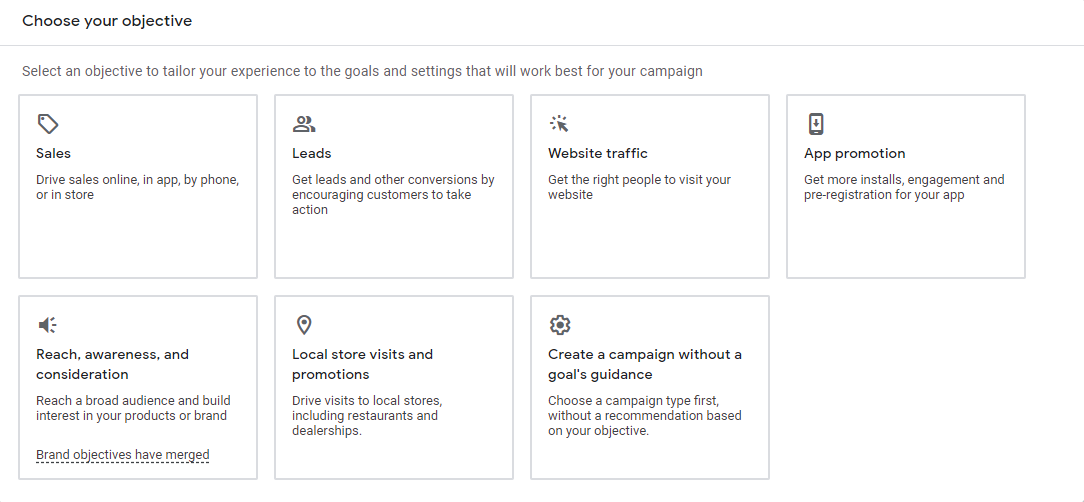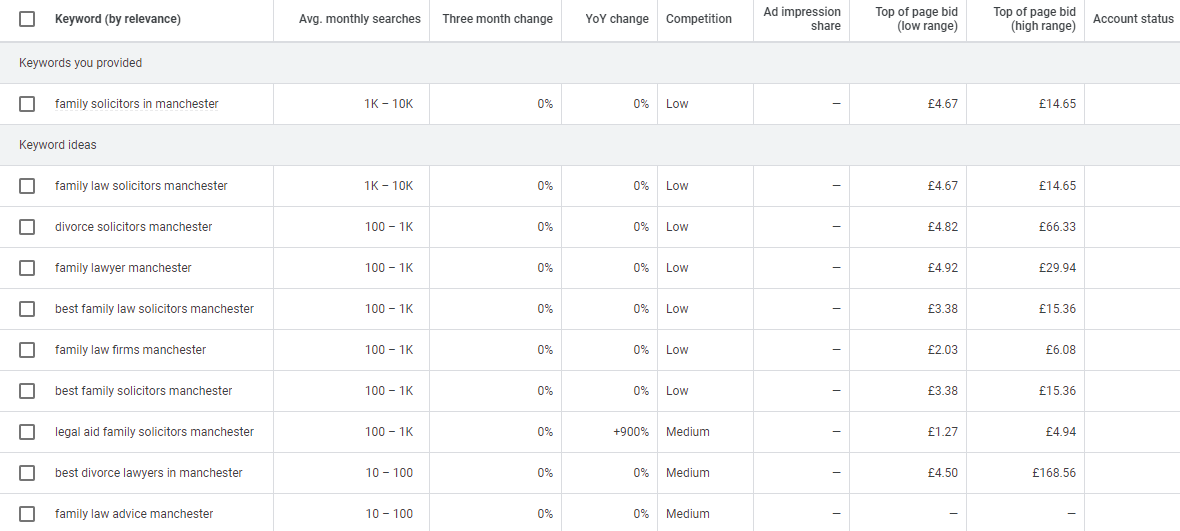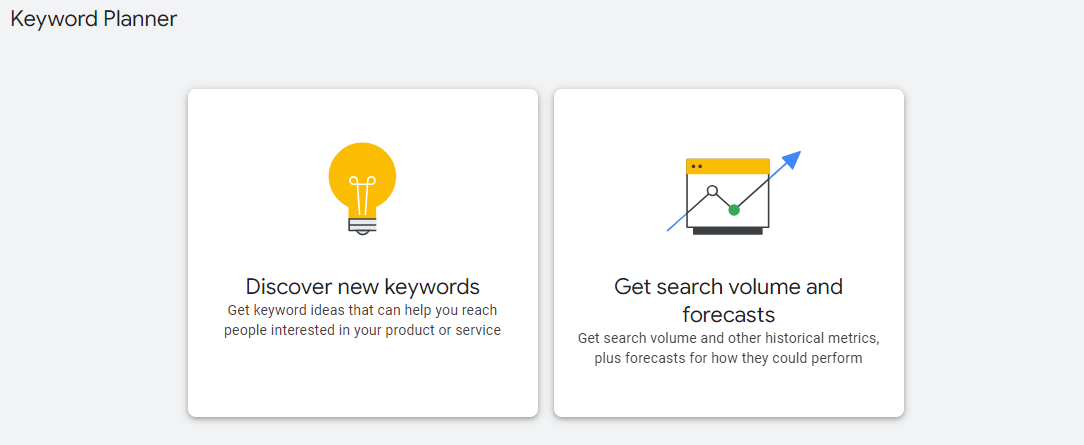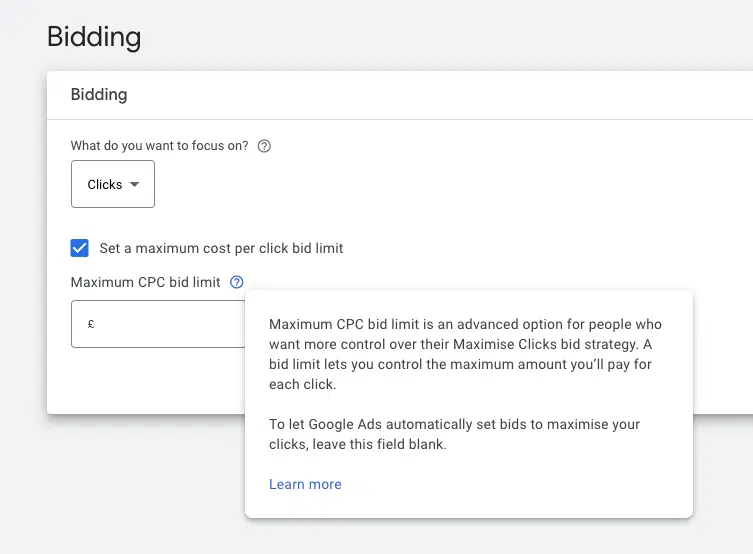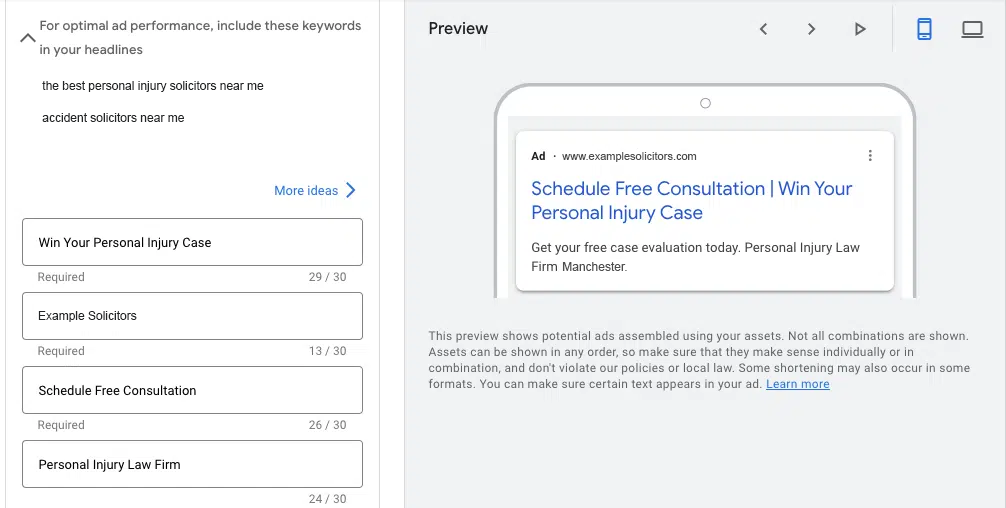PPC for Solicitors
Learn how to achieve paid search success for your campaigns with our PPC guide for solicitors – we explain PPC best practices to ensure your return on investment is high while minimising advertising costs.
PPC for Solicitors
Learn how to achieve paid search success for your campaigns with our PPC guide for solicitors – we explain PPC best practices to ensure your return on investment is high while minimising advertising costs.
PPC for Solicitors
Learn how to achieve paid search success for your campaigns with our PPC guide for solicitors – we explain PPC best practices to ensure your return on investment is high while minimising advertising costs.
PPC marketing enables your law firm to attract highly targeted leads and increase its online presence. Through utilising paid search campaigns, your solicitors can optimise their digital marketing efforts and achieve tangible results.
Pay-per-click marketing for law firms is dynamic and ever-evolving, so staying updated with the latest trends and strategies is crucial to maintaining a competitive edge. Our helpful guide below explores PPC for solicitors and the many techniques to benefit your business.
What is PPC for solicitors, and why is it important?
Pay-per-click, or PPC, is an advertising method that allows your law firm to display online ads within the search engines. In return for these placements, you must bid on your target keywords and pay a fee each time someone clicks on your ads. When correctly set up, PPC can help your law firm acquire high-quality leads.
Consequently, PPC for solicitors uses the same ranking criteria as pay-per-click campaigns across all industries, scoring your ads based on their relevance to your audience and helpfulness. Then to rank your ad, Google will use a Quality Score based on how relevant your ad copy is to your bidding keywords.
Highly regarded by online advertisers due to their measurability and cost-effectiveness, more than 50% of consumers click on PPC ads, making them a crucial part of your digital marketing strategy.
Common PPC terms
Before you start working on your PPC campaign, we recommend familiarising yourself with the paid search terms below and what they mean for your business.
- Cost-per-click (CPC) – the amount an advertiser pays when someone clicks their paid ad
- Click-through rate (CTR) – the number of clicks on your advert vs. the number of times it was shown (impressions)
- Conversion rate – visitors who convert into customers after clicking your advert
- Cost-per-acquisition (CPA) – the average cost of turning ad clicks into conversions
- Return on ad spend (ROAS) – the ratio of the money gained (or lost) vs. the amount spent on PPC ads
- Quality score – how Google ranks ads based on several factors, including keyword relevance
- Ad rank – a ranking that determines your ad’s overall position in search engine results pages
- Exact match – an option for showing your ads only when the search query is an exact keyword match
- Broad match or broad keywords – your ad will show even with keyword variations
- Ad extensions – these are added information shown below your main PPC ad. e.g. A “Call” button, pricing information, or a link to a landing page
Learn more with our free resource: Search Marketing Terms You Need to Know
Benefits of PPC for solicitors
Implementing a thorough PPC marketing strategy offers several benefits for solicitors and law firms seeking to grow their online presence and attract new clients. These include:
- Immediate results and improved visibility in the search engines
- Targeted audience reach
- Flexibility in scaling campaigns based on your performance and budgets
Immediate results and improved visibility
Once you publish your PPC campaign, your ads can appear at the top of the search engine results, helping your law firm stand out and capture the attention of potential clients.
This instant visibility can be particularly beneficial in highly competitive legal niches, where gaining an edge over other solicitors is crucial for success.
Additionally, PPC advertising allows your solicitors to utilise ad extensions, such as location details, site links, and CTA (call-to-action) buttons. They provide users easy access to essential information directly from the search engine results page.
When you include these paid ads and ad extensions, your PPC ads become even more visible and appealing to potential clients, while increasing the likelihood of attracting qualified leads.
Targeted audience reach
Secondly, PPC advertising enables your solicitors to target specific demographics, locations, and interests, ensuring your ads reach the most relevant audience.
Through strategic keyword selection and negative keywords, you can filter irrelevant searches and focus your paid ads on attracting users seeking your legal services.
This targeted approach helps to maximise the return on investment (ROI) for your PPC ad campaigns.
Additionally to keyword targeting, PPC platforms like Google Ads offer advanced targeting options, such as demographic and location targeting.
These options allow your law firm to refine its audience and ensure anyone who sees your ads is more likely to convert into paying customers. Therefore, by leveraging the power of targeted audience reach, you can optimise your PPC campaigns for maximum impact and ROI.
Flexibility and Scalability
PPC campaigns offer your law firm flexibility and scalability in managing its digital advertising efforts. Markedly with PPC for solicitors, you can easily adjust your PPC ad spend amount, pause underperforming campaigns, or scale up successful campaigns to maximise results.
This flexibility will empower you to enhance your PPC marketing efforts. It enables you to allocate your budget more efficiently, optimising your PPC campaigns and overall PPC marketing and ad campaign strategy.
Moreover, PPC advertising enables you to track and analyse campaign performance in real time, supporting data-driven decisions and continuously optimising your campaigns for better results.
By monitoring key performance metrics such as click-through rates, conversion rates, and cost per acquisition, your law firm can identify areas for improvement. Or, make necessary adjustments to ensure optimal budget utilisation and campaign effectiveness.
Top PPC marketing mistakes by solicitors
Using ineffective keywords
Firstly, ineffective keywords can lead to wasted ad spend and low conversion rates for your campaigns because ads may appear for irrelevant search queries or fail to reach the intended audience.
In that case to avoid this common mistake, your solicitors should conduct thorough keyword research. Utilise the Google Keyword Planner to identify relevant, high-performing keywords that align with your target audience’s searches.
What’s more, we recommend incorporating negative keywords into your PPC ad campaigns to exclude incorrect searches.
For example, you might be targeting the keyword “criminal solicitor,” but your ads appear in searches related to “famous criminal solicitors”. Eliminate this by adding “famous” as a negative keyword to your ad group. This will alert Google not to show your ad in any searches that include the word “famous”.
When focusing on relevant, high-performing keywords and excluding irrelevant searches with negative keywords, your law firm can optimise its keyword selection and maximise the effectiveness of its PPC advertising campaigns.
Poor ad copy
Secondly, poor ad copy can lead to decreased click-through rates and a less effective campaign, failing to engage potential new clients and encouraging them to click on your ad.
In this case, your solicitors should create compelling ads that address the needs and concerns of potential new clients while incorporating relevant keywords. Also, a call to action is crucial for motivating users to click on your ad and visit your website.
Given these points, we recommend A/B testing to determine which ad variations resonate best with your audience. Consistently refining your ad copy and adhering to best practices, will boost your click-through rates and attract more qualified leads to your website.
Using irrelevant landing pages
Thirdly, optimise your landing page for more conversions. All landing pages should have a clear CTA and creative content related to your legal services.
Generally, it’s also good practice to create multiple landing pages that appeal to different target markets (instead of sending your leads to one page). This will reduce the risk of penalisation from Google because the content is irrelevant to your ad.
Poor location targeting
Fourthly, unless you offer legal services virtually, your PPC ads should include location-based keywords. They will narrow your target audience, increasing the odds of a click and a conversion. Subsequently, removing your local keywords will result in your ad appearing in front of people within areas unsuitable for your business.
Therefore, by enabling the location extension within Google Ads, you can enjoy geo-targeting, capturing users in specific locations close to your solicitors.
Learn more with our free resource: How to Setup Location Targeting in Google Ads
Neglecting your PPC campaigns
Once you publish your PPC campaigns, they require constant attention to ensure you see the best results. What worked today may not work in a few weeks. Continually monitoring your keywords, copy, images, and CTAs is crucial to a successful campaign.
Analyse your campaigns to determine which ads are not performing (clicks but no conversions/impressions) and test different variations to see what increases your clicks and conversions.
Our PPC services for solicitors
Competitor Analysis
A key part of PPC for your solicitors is identifying and analysing your competitors. Once you understand who they are, how they run their online ads, and the legal services they’re promoting, this will direct your PPC strategy.
LOCALiQ’s analysis will guide PPC techniques, from compelling ad copy and successful keywords to your targeted location strategies and audience demographics.
Campaign Creation
Once we’ve assessed your competitors and planned our strategy, we will create your PPC campaign. There are many areas to ensure you see the best results for your budget. These include;
- Choosing your campaign goals to determine why you’re running a PPC campaign (drive more traffic, lead generation, or promote a resource)
- Researching specific keywords and audiences, these will then be divided into different ad groups (for example, family solicitors and employment law ads will each have different campaigns)
- Defining your audience demographics, location, age, gender, income
- Selecting the most efficient days and times to target your audience, we will research their busiest hours and target them when they are at their most active
- Setting a daily budget which works for your business (this includes the cost-per-click and cost-per-acquisition for each ad)
- Building your adverts by including compelling copy, headlines, CTAs and images to capture your audience
- Monitoring your PPC ads to assess their performance and conversions, and if necessary, updating their features to see what improves their results by utilising A/B tests
Keyword Research
Keyword research enables us to find suitable keywords for your PPC ads, helping you discover new searches relevant to your law firm and suggestions for keywords related to your legal services.
These search queries will guide the content creation for your adverts, display search estimates for your keywords each month and determine your PPC ad campaign budget via average costs.
Remember, broader keywords with higher search volumes are more competitive and costly to bid on. However, lower-volume, long-tail keywords are more affordable. For your keywords, mix higher and lower-volume keywords to use in your PPC ads. They will help to balance the cost of your total campaign spend.
Discover solicitor-related services and popular-related topics your customers are searching for with the Google Ads Keyword Planner. Generate keyword ideas, estimated monthly search volumes and many PPC metrics from their comprehensive keyword database.
How to get started
- Enter your industry-related phrases into the keyword planner – solicitor, solicitors, law solicitors, family solicitors.
- View your keywords & their metrics – analyse different keywords by their monthly search volume, competition and costs.
- Save your keywords – save your selected solicitor keywords into an Ad Group so you can view them quickly and easily across legal areas.
- Add your negative keywords into the Ad Group. They will alert Google not to show your ad in any searches that include these keywords, maximising the effectiveness of your advertising campaigns.
Landing Pages That Convert
Alongside building your PPC campaigns, we will create a landing page for each service/audience you target within your ads.
As a result, our landing pages will drive conversions for your ads, strategically placing effective CTAs throughout the page and increasing the chances of each visitor leaving their details. Therefore, this ensures you can quickly contact them while their interest is still warm.
As PPC marketing experts, our landing pages will answer your visitors’ needs as clearly as possible. We keep things simple to help capture their details and boost your Google Ads Quality Score, helping your adverts rank higher than the competition.
Reporting and Analytics
Afterwards, you will receive access to Client Centre, complete with a video tutorial explaining how to enjoy 24/7 pay-per-click reporting for your legal marketing campaigns.
Exclusive to LOCALiQ, our all-in-one marketing analytics tool will help you feel safe with your investments and provide real-time reports and instant results for your PPC campaigns.
Stay in control of your marketing and enjoy cost-effective advertising decisions while achieving the maximum return on investment for your budget with Client Centre. Benefits include:
- Single dashboard to view all aspects of your marketing
- Powerful insights to understand your routes to success
- Comprehensive and easy-to-use reporting
- Call tracking and recording
- Lead management and engagement
- Email marketing automation
PPC top tips for solicitors
1. Target the the right keywords
Keyword research is the first step to discovering and selecting which targeted keywords you want to use in your PPC campaigns. Google Keyword Planner can help you conduct keyword research for your PPC campaign.
Choosing the right targeted keywords is crucial to your campaign. However, most solicitors make the mistake of targeting the wrong keywords in their paid ad campaign, some with high CPCs.
With this in mind, for an effective PPC campaign, we recommend using long-tail keywords; these are specific keywords. You will likely see more conversions with the keyword “best divorce solicitor near me” than simply “divorce solicitors”.
They should also be implemented into your ad copy and optimised in your landing pages. Always target relevant keywords that match your legal services to increase your ad’s quality and relevance score.
Learn more with our free resource: What Are Long-Tail Keywords, and Why Are They So Important?
2. Save money by using different match types
Solicitor-related search terms can be expensive if you’re targeting general terms. Google Ads use keyword match types to dictate when your ad appears online, depending on the search terms.
For example, you could use a “broad match” to show your ad to a wide audience or an “exact match” to target specific groups of potential clients.
When you use different match types, two things happen:
- Your relevancy potentially increases
- Your PPC cost may decrease
There are four match types available:
Broad match
Close variations of your selected keyword, related searches, and other relevant variations will trigger Google to display your PPC ad to the user. As a result, you don’t necessarily have to use the exact keyword in the search.
Broad match modifier
With this type of match, you can include any keywords that are variations or close to your identified keyword using a + sign. These additional words can appear before, after, or between the terms.
For example, if you want to target “family solicitor price in Guildford”, you can add +cost, so you capture any search terms that might use this word instead of “price”.
Exact match
Google will show your ads in search results based on exact matches of your keyword or close variations of that exact term with the same meaning.
Phrase match
The search engine will trigger your ad for matches of the phrase (or close variations of the phrase) with additional words before or after. Furthermore, if “family solicitor in Guildford” is your keyword, your firm will show up for searches that include “best family solicitor in Guildford” and “family solicitor in Manchester reviews”.
3. Create separate ads for your target audience
As solicitors offering different legal services, consider your target audience for each PPC advertising campaign. If you practice law across many areas, including divorce, employment tribunals, and criminal law, create separate ads for each.
You will then need to organise related PPC ads into an ad group and name them according to how they are categorised. Ad groups will help you test and change specific keywords in your PPC ads.
4. Start with manual bidding
When you first create your Google Ads account and build your law firm’s PPC campaign, you’ll see several choices on how to bid. Google will recommend automatic bidding, but we recommend starting with manual bidding for your first PPC ad spend.
They will give you more control over how much you pay for each click and prevent overspending your PPC budget.
When adjusting your bid, you can enjoy the same (or better) PPC campaign performance for a lower cost.
5. Aim for a lower CPC with your PPC ads
Once you’ve run your PPC campaigns for a month, you’ll have to monitor your ad’s performance and decrease their CPCs.
With this data, you can identify keywords in your PPC ads that are not performing and either pause or lower their bids. You’ll also need to increase your bids for high-performing PPC campaign ads.
As explained earlier, we also recommend using negative keywords. Negative keywords are phrases you do not want to include in your law firm’s PPC campaign.
You can find this option on the left-hand panel when clicking on a campaign name in Google Ads. When you exclude irrelevant keywords, you will improve your ad’s performance and help lower its CPC.
6. Use location-targeting in your campaigns
Google Ads has a feature that lets you create a targeted audience for your PPC campaign based on your ideal client. When setting up a PPC ad, you can choose a location, or several, where you want to display your ads.
You can search for a city, town, or postcode and set the location as a target or exclusion.
Learn more with our free resource: Local Search Ads: How to Run a Local Search Campaign
7. Use ad extensions to boost your click-through rate (CTR)
Potential new clients will want to connect quickly to assess if your solicitors are right for their needs.
Likewise, you want potential legal clients to get in touch so that you can generate new business with the right audience. To simplify the experience for both parties, using Google Ad Extensions is a great solution.
Ad extensions include:
- Call buttons
- Location information
- Links to specific parts of your website
According to Google, they typically increase your CTR by several percentage points.
If a potential client is quickly searching for a solicitor on their smartphone, they will click on the first one that includes a phone number in their ad. Whereas clicking through a website and searching for the phone number is too much work.
8. Write compelling ad copy to capture your audience
Whether you’re creating text or image ads for your PPC content, your ad copy should capture the attention of potential clients and compel them to click. If your solicitors do not have the resources to write ad copy, our award-winning PPC team can support you with these.
The ad copy for Google ad campaigns is composed of the following:
- Headline (at least 3)
- Description (at least 2)
- Ad extensions
9. Ensure your landing page converts
Capturing potential leads via your PPC campaign is only half the challenge – a successful PPC campaign should convert potential leads into new customers. A conversion-focused landing page is the key to revenue-generating ads for your law firm.
Your landing page should continue your PPC ads and lead potential clients to the next step. Our PPC team are ready to guide you with your landing pages – their experience and expertise will help to increase your ads conversion rate.
10. Optimise your website
You’ve optimised your landing pages for your target audience, but don’t forget to update your website. Your visitors will likely browse through the rest of your pages to research your law firm – this is an opportunity to showcase your legal expertise.
We recommend including your latest reviews and continually updating your legal case studies to promote your success with your clients.
11. Conduct A/B tests on your PPC campaigns
A/B tests are across many digital marketing campaigns, including web design and email marketing. For PPC advertising, running A/B tests is when two or more versions of ads run together, and you compare their results over time.
Google Ads has a guide on creating A/B tests using the “Create experiment” function. Follow these steps to run your own Google Ads experiment, whether it’s targeting different landing pages, keywords or locations.
After a few weeks of running your ads, you can check the results in your ‘Experiments’ dashboard.
You’ll see which advert resulted in a higher conversion rate, including other related stats that can influence your law firm’s PPC strategy.
12. Track your PPC advertising results
Assess if your PPC campaigns generate revenue and new clients for your solicitors by tracking and analysing their performance.
If you’re running Google Ads, the simplest way to track your PPC ad performance is to connect your Google Ads account to Google Analytics. See how your PPC campaigns perform, with key metrics like CPC and CPA (cost-per-acquisition), ROAS (return on ad spend) and conversion rate.
Depending on your data, you might need to improve your ads or adjust your bids for better results.
Need more help with PPC for your solicitors? Our award-winning team are waiting to hear from you. Visit our PPC page to find out more and discover our many PPC services.

